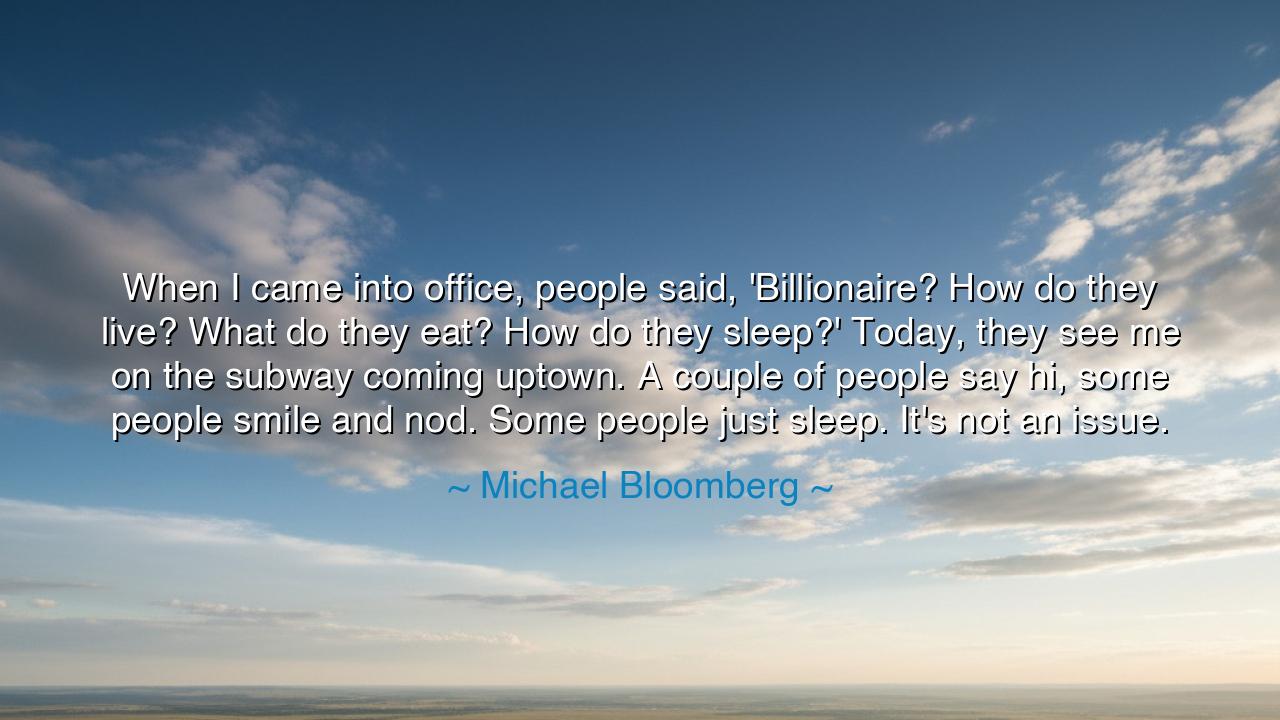
When I came into office, people said, 'Billionaire? How do they
When I came into office, people said, 'Billionaire? How do they live? What do they eat? How do they sleep?' Today, they see me on the subway coming uptown. A couple of people say hi, some people smile and nod. Some people just sleep. It's not an issue.






The words of Michael Bloomberg are both humble and instructive: “When I came into office, people said, ‘Billionaire? How do they live? What do they eat? How do they sleep?’ Today, they see me on the subway coming uptown. A couple of people say hi, some people smile and nod. Some people just sleep. It’s not an issue.” Here is the testimony of a man who, despite extraordinary wealth and position, chose to present himself as ordinary, walking and riding among his people without the pomp of privilege. His reflection reveals the truth that greatness in leadership lies not in separation from the people, but in shared humanity.
The opening words recall the awe and suspicion that wealth inspires: “How do they live? What do they eat? How do they sleep?” To many, the billionaire is a creature almost mythic, imagined to exist in another world, surrounded by walls of power and luxury. Yet Bloomberg shatters this illusion by describing the simple act of taking the subway. In this, he teaches that wealth need not remove one from the rhythms of common life. Instead, the truest power lies in the ability to remain among the people, seen not as an untouchable figure, but as a neighbor who greets with a nod and receives with a smile.
The subway itself becomes a powerful symbol. It is the vessel that carries the many: the worker, the student, the traveler, the weary, and even the sleeping stranger. By placing himself in this shared space, Bloomberg dissolves the boundary between ruler and ruled, showing that leadership does not require distance, but closeness. In ancient Rome, emperors were often criticized for retreating into their palaces, far from the voices of the people. The best leaders, however—like Marcus Aurelius—sought to walk among the citizens, listening, learning, and reminding themselves that they too were mortal. Bloomberg’s subway rides belong to this same tradition.
History gives us another vivid example. Abraham Lincoln, though President during the gravest war of his nation, often made himself accessible to ordinary citizens. Farmers, soldiers’ widows, and common workers came to his office, and Lincoln received them without ceremony. To those who wondered why he would spend so much time with the lowly, he replied that the government belonged to the people, and he was their servant. In the same spirit, Bloomberg’s subway journeys remind us that leadership must never grow so lofty that it forgets the dust and sweat of the everyday.
The mention of people smiling, nodding, or simply sleeping carries another lesson: that normalcy is itself a sign of respect. Once, people wondered at the mystery of his wealth; now, he has become familiar, even unremarkable, to the citizens he governs. This is a triumph, for it means he has not set himself apart, but has blended into the life of the city. The smile exchanged between mayor and citizen is not one of distant admiration but of mutual recognition, as though to say, you are one of us.
The deeper wisdom here is that true leadership does not depend on wealth, but on trust. The billionaire who hides behind gates is a stranger to the people; the leader who walks their streets and rides their trains becomes their companion. Bloomberg shows that respect is earned not by flaunting distinction, but by embracing simplicity. When the extraordinary becomes ordinary, when the great man becomes neighbor, then society itself is strengthened.
The lesson for us is clear: whether rich or poor, powerful or humble, we should live in such a way that others are not awed by us, but at ease with us. Wealth should not isolate, but serve. Authority should not distance, but draw nearer. In your own life, do not hide your gifts in pride; rather, bring them into the common spaces, where a simple smile, a nod, or even unnoticed presence can testify to humility.
Thus, Bloomberg’s words remind us of a truth known since the ancients: that greatness is not measured by how high above others one stands, but by how deeply one remains among them. To ride the subway is to ride with humanity; to be greeted with smiles is to be accepted as one of their own. And in this acceptance lies the highest honor a leader—or any person—can receive.






AAdministratorAdministrator
Welcome, honored guests. Please leave a comment, we will respond soon